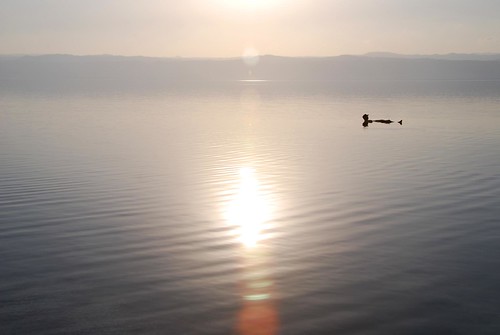Archive for February, 2010
It’s ON. The Middle East portion of our trip, that is. Sure, our last destination, Turkey, has a strong Muslim culture, but it’s tempered by both European and Asian influences. Landing at the Amman airport, we saw men sneak off to the bathroom to change from Western suits into traditional thawb (an ankle-length white dress that looks like a long button-up shirt), keffiyeh (red and white checkered scarf), and agal (a circular black cord that sits on the head, keeping the keffiyeh in place). And in much larger percentages, we noticed women in full burqa and face veil (rather than just a head scarf). Toto, we’re not in Turkey anymore.
We chose Madaba over Amman as our first destination in Jordan, mostly on the advice of this website: Jordan Jubilee (a FABULOUS resource if you are ever visiting Jordan), which described Madaba as a pleasant town full of mosaics and Amman as a big, soulless city. SOLD! Madaba it is. Perhaps based on that description, I was expecting Madaba to be quite charming, but the reality is, Jordan looks a lot like this, with miles and miles of expansive desert in between the concrete jungles:
The concrete jungle of Madaba.
Still, Madaba does have a few advantages over Amman. First, it’s known as the Mosaic City, most famously because of a mosaic map of the Holy Land set into the floor of St. George’s church.
Mosaic map of the Holy Land in St. George’s Church, Madaba.
Secondly, Madaba is close to the Dead Sea, the lowest point on the planet (almost 1400 feet below sea level)! The water is so salty in this lake that you can literally stick your arms and legs out of the water and still float. In fact, it’s hard NOT to float in these waters—as soon as you lift your legs up, it’s like someone is pushing your butt to the surface. It was the strangest—and coolest—sensation!
Jeremy floating in the Dead Sea with arms and legs out of the water.
There’s even a nice “resort” near the Dead Sea (called “Amman Beach”), with a pool, showers, and lounge chairs. At 12 Jordinian dinars (US$17) each to get in, it’s not cheap, and it’s true that you can walk down the highway and enjoy the Dead Sea for free. But trust me—you’re going to want a fresh-water shower after floating in that water. The high salt content makes it…hmm, how shall we say? A bit stingy on your sensitive parts.
Salt deposits near the shore of the Dead Sea.
Jeremy’s been to the Dead Sea before (via Israel), but he prefers this body of water on the Jordan side. Why? Well, if you’re in Jordan, you can watch the sun set over the water…and what a sight!
Jeremy afloat at sunset.
Hope emerging from the Dead Sea.
Alright, so we’re not in Turkey anymore. And the towns aren’t as pretty in Jordan as they are in that country to the north. But hey, how often do you get to float in a prehistoric lake with waters 9 times saltier than the ocean? We had such an amazing time in Turkey that almost anything that followed was sure to be a downer…but so far, Jordan’s doing a pretty decent job of holding it’s own.
Transportation from Van, Turkey to Madaba, Jordan: Our travel from Van to Madaba was one of those “We-probably-should-have-researched-this-a-little-better-before-booking-our-around-the-world-tickets” kind of moment. See, Van is in southeastern Turkey, so we were set up to cross overland into Syria (we hear it IS currently possible for US passport holders to get Syrian visas) and then into Jordan. Instead, we flew all the way the heck back to Istanbul (in the west), where we caught our OneWorld Alliance flight east to Amman, Jordan. Kinda silly, but we had no way of knowing that we would end up in Van when we booked our around-the-world tickets. Sometimes you do pay for that spontaneity in travel.
Where we slept in Madaba: Apparently The Black Iris Hotel is considered a one-star accommodation, so either our standards were REALLY low at this point, or it is vastly underrated, because we thought it was pretty freakin’ nice! We paid 23 JD (US$32) for a nice double room with private bath. The owner is really nice and helpful in setting up your transportation to the Dead Sea or wherever you’re going next.
I’ve been trying to find words that can capture the incredible affection we’ve developed for Turkey, and I’m afraid that nothing I write can adequately describe how amazing this place is. Like our three other favorite countries (New Zealand, Taiwan, and Japan), Turkey feels magical somehow. Maybe it’s the jaw-dropping landscape, maybe it’s the kind and generous people, maybe it’s all that incredible art and architecture. Or maybe it’s all three of those things. All I know is: this planet is a better place because of Turkey. Need we find more words than that?

Jaw-dropping landscape. Check.

Kind and generous people. Check.

Incredible art and architecture. Check and double check.
Days spent here: 28 (August 11-September 8, 2009)
Highlights: Heads up, mouths agape in Istanbul, boat trips in the Turkish Mediterranean, exploring surreal landscapes in Pamukkale and Cappadocia, getting off the beaten path in Eastern Turkey.
Places we would like to visit next time: Mardin, and more of Eastern Turkey. Also, we’d love to explore the Black Sea coast in depth.
Average daily expenditures (for two people): US$120/day
Prices: There are rumors floating around that Turkey is not really the bargain basement European destination it once was, and while that’s probably true, once you get out of Istanbul, prices can drop dramatically. After a false start in Istanbul with THE WORST HOSTEL EVER, we moved to a much more pleasant place for €45 (US$60) per night. €45!!! (And that room was one of the cheapest we found.) As a comparison, we averaged about half that much for similar rooms in the rest of Turkey.
Food is also cheaper once you get out of Istanbul, but not as dramatically so. We averaged around $5-7 each for lunch and about $10-12 each for dinner. Breakfasts are usually included in the room price (see “Food” section below).
Museum and entry fees can pack quite a punch in Turkey (apparently all ticket prices doubled in 2008), particularly when you are charged to enter the complex as well as individual buildings within a site (ex. entering the Harem in Topkapi Palace), so choose your carefully!

Pattern overload in the Harem, Topkapi Palace.
Transport in Turkey is not dirt cheap, but it is an extremely good deal—you can bus halfway across the country (a 15 hour ride) in a comfortable, clean vehicle with stewards serving you tea and cakes for 55 TL (US$40).
Guidebooks we used: Lonely Planet Turkey and Tom Brosnahan’s Turkey Travel Planner. After finding the LP indispensable throughout Southeast Asia, we were disappointed with our Turkey guide. It’s perfectly passable if you are sticking to the country’s most heavily touristed areas: Istanbul and the Aegean and Mediterranean coasts. But once you venture off that well-beaten path, information in the LP is either incorrect, incomplete, or (in some cases) incompetent.
Luckily, Turkey Travel Planner was able to fill in the gaps where the LP failed. Tom Brosnahan has amassed excellent information on destinations that are not quite as heavily touristed. We also found his posts on the best Turkish bus companies and travel during Ramazan very helpful.
Weather: We were in Turkey late summer/early fall, and the west and central parts of the country were HOT. There were rumors that the Mediterranean coast hit 40°C (104°F) after we left. Yowza!!! I can’t imagine how stifling it must get in the dead of summer.

The Mediterranean coast’s relentless sun.
The eastern side of Turkey was quite temperate, however, and at times downright cold (And rainy. And foggy. Oh yeah, and hail-y).
Overall, it was an excellent time to visit, since the temperatures were relatively moderate during this time of the year.
Food: Traveling through west and central Turkey, we found the food to be tasty, but quite repetitive. Three weeks of doner kebap with a side of lettuce, tomato, and cucumber two times a day will do that to you. Turkish breakfast is more of the same, minus the kebap. You can imagine how hard it was to go from an English breakfast every day to this!:
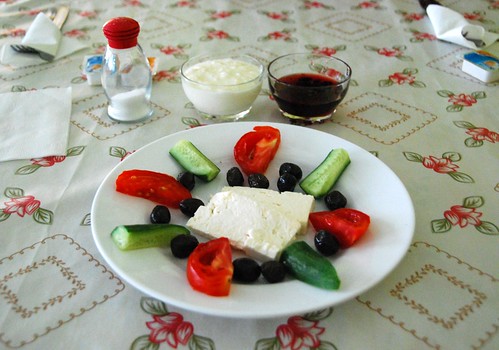
A typical Turkish breakfast: cucumber, tomato, feta cheese, olives (if you’re lucky), and bread.
As soon as we hit the east, however, Turkish food improved dramatically, both in taste and in variety. We ate Turkish fondue in the Kaçkar Mountains (at a lovely little family-run place named Yilmaz Cafeterya—if you’re ever in Ayder, you must go!), incredible lamb, yogurt, and eggplant dishes in Kars, and spiced ground beef with pine nuts stuffed inside a pastry shell in Van. So there you have it: east beats west. At least in Turkish cuisine.
Accommodation: We stayed in double rooms ensuite in budget guesthouses and pensions throughout Turkey and averaged about US$30 per night. Rooms and hotels in the east tend to be a little grungier than in west and central Turkey, but they are still adequately clean.
As I mentioned in a previous post, for the first time on the trip, we started going with the hotel touts whenever we arrived in a town (only in western Turkey—there were no touts in the central and eastern part of the country). Part of the reason is that touting in Turkey appears to be much more relaxed and low pressure (especially when compared to SE Asia)! We were never disappointed.
Transit: Turkish buses are amazing! Not only are they comfortable and clean, but little dudes in bow ties and cummerbunds serve you Turkish tea and cakes throughout the ride. Classy!

Turkish buses are nicer than this. We promise.
Internet: Every guesthouse we stayed in had wi-fi internet access either in the hotel or close enough to pilfer. The one exception was Ayder, though we were able to find a connection in the middle of town.
Culture: We’ve heard other people who’ve visited Turkey complain about how oppressed Muslim women are. We’ve heard solo women travelers complain about being sexually harassed. And we’ve heard tourists complain about being hassled at the markets.
I am sure all of those things are true. But if it wasn’t already clear by now, let me spell it out for you: our experiences with the Turks left us confident that they are the nicest, most generous, most hospitable people on the planet. Turkish people are AWESOME. Capital A. Capital W. Capital E. Capital SOME. AWESOME.
In short: It bears repeating: the world is a better place because of Turkey. ‘Nuff said.
You may know it as Ramadan, but it’s Ramazan to the Turks. Ramazan is the Islamic holy fasting month, when Muslims refrain from eating, drinking (even water), chewing gum, and smoking during daylight hours. It’s meant to remind Muslims of the difficulties the less fortunate face, and to teach compassion and charity.

The star and crescent moon (a symbol of Islam) on top of Topkapi Palace in Istanbul.
It can also have a bad rap amongst travelers: there are rumors that buses can be completely booked (true, but only at the tail end of the fasting month, when people travel celebrate the completion of Ramazan with their families), that people get snappy due to hypoglycemia and nicotine withdrawals, and that restaurants will close down in observance of the holiday, making life difficult for the non-Muslim traveler who flew all the way across the world to try some of that famous kebap.
All of this can be true (to degrees), but we found traveling in Turkey during Ramazan both fascinating and relatively painless. From our experience, there are two essential truths about this Islamic holy month:
- If you stick to the heavily touristed areas, you won’t be affected by Ramazan. Ramazan started while we were in Patara, and we traveled along the Mediterranean coast on through Cappadocia without even really noticing the holiday. Sure, there was the nightly drumming (see “Ramazan is LOUD” below), but we never had any problem finding food, and most restaurants were still serving alcohol. The only time we felt the burden of Ramazan was in the east, which brings me to my next point:
- If you get off the beaten path, you WILL be affected by Ramazan. As soon as we got off the bus in eastern Turkey, it was clear that we were going to have to change our public eating, beer-drinking, water-swilling ways. Restaurants were boarded up. Men were sitting around empty tables looking sad and listless. And not a soul on the street dared to smoke a cigarette (uncommon in this part of the world!).
If you find yourself in a town that observes Ramazan, there are a few things you need to know.
DO bring earplugs, because Ramazan is LOUD. From the local mosque ghetto-blasting the call to prayer several times a day, to the guy banging a drum in the wee hours of the morning…if there’s one thing that Ramazan is, it’s LOUD. Bring your earplugs, because otherwise you won’t get a wink of sleep.

The green mosque in Van, right outside of our hotel window. Possibly a poor choice of lodgings during Ramazan.
During the fasting month, Turks wake up at the ungodly hour of 3 AM to prepare the morning meal before the sun rises. We were woken up every night in Cappadocia by the incessant beating of drums—the town crier trying to wake locals for their morning feast. It was obvious that Ayder had a smaller Ramazan budget—their human alarm clock had to make do banging some pots and pans together. And don’t think you’re out of the woods after the drumming stops—there’s the family of 6 staying in the room above you, making a huge ruckus as Mom starts preparing food and the kids are chasing each other around before their first meal.
DON’T eat in front of the locals if you are in a town that observes Ramazan. Again, we barely noticed it was Ramazan while traveling in western and central Turkey. But once we hit the east, we had to be more careful about eating and drinking water in public. It’s just plain rude to partake in front of fasters.

Buy, but don’t try (at least not in public). Kars’ famous cheese and honey.
Our attempts to stay out of sight while eating and drinking had us crouching in the back of an Ayder-bound bus, guiltily trying to Hoover our sandwiches before the aroma of fresh kebap could reach the passengers in the front. But try not to feel too racked by guilt, because:
DO realize that people will cheat during Ramazan (and DO try to find a restaurant BEFORE you get hungry, because it might take a while to find one). Most restaurants in Van (including their famous kavalti salonu—breakfast houses) were closed during the lunch hour while we were visiting. After wandering around for ages with our stomachs grumbling, we finally found a bakery that was open and asked the owner if he knew of a place where we could find a real meal. He walked us into a back alley, past a hidden room where Turkish men were drinking tea, into a shop whose windows were covered with newspaper, and our protesting stomachs were finally sated. Evidently this is where cheaters go for drinks and food when they’re desperate. I’ll be honest: cheating never tasted so good.
And I’ll never forget watching our friend in Cappadocia (who shall remain nameless, in order to protect the not-so-innnocent) crouching behind a wall, sneakily cracking nuts and drinking Fanta. Hey, even the devout get hungry.
DON’T worry that people are going to be cranky. We were concerned after hearing reports of impatient and hangry locals during Ramazan, but one look at our stories from Van and Cappadocia should convince you that nothing is the further from the truth. Fasting Turks can, however, be a bit listless. We saw clusters of old men sitting around empty tables on the street, looking mournfully at the spot where their tea glasses normally reside. Sad. ![]()

Some decidedly uncranky little troublemakers in Kars, all fired up before nightfall, when Muslims typically break fast.
DON’T try to eat dinner at 6:30 PM. Here’s a rule of thumb: 6:30 PM is the witching hour in Turkey. This is the time that Muslims are allowed to break fast, so the restaurants are PACKED with people, the waiters are frantic, and you may not be able to eat unless you have a reservation. Show up and 7:30, and you’ll eat in peace.
DO try to make Turkish people laugh during Ramazan. Who knows? You might get some free baklava. ![]()

Delicious Turkish treats in Van.
There’s no better way to understand Turkish culture than by observing it during Ramazan. We loved traveling in Turkey during the fasting month, and would encourage others to do the same…as long as you don’t mind a bit of drumming in the middle of the night. ![]()
There comes a time in every travel blogger’s life where you fall behind on your blog (four months in our case). And there comes a time when something so unexpected happens—something so amazing that it manages to infuse your cynical spirit with pure faith in the goodness of this world—that you feel like you can’t possibly wait four months to tell the world about it. This is one of those times.
Van is a town in southeast Turkey, set on the eastern shore of Turkey’s largest lake (called, fittingly, Lake Van).

Storm over Lake Van. The lake is so large, some Turks refer to it as a sea.
At this point in our journey, we’ve learned a few lessons about traveling Eastern Turkey:
1. All the information in our guidebook is at best incomplete, and at worst incorrect
2. Nobody speaks English
Sure, this makes things like finding a hotel and getting around more complicated, but not insurmountable. But you know what is kind of hopeless? Trying to remain anonymous, even in a big town, because:
3. Everybody—and I mean EVERYBODY—will stare at you (if “you” happen to be an Asian woman)
Not in an aggressive way, and not in a judgmental way, but in a very, very curious way. If you ever wanted to know what it’s like to live the life of a bacterium under a slide, visit Van, Turkey.

Am I being paranoid, or is she staring at me too?!?
One day, J and I decided to head out to tiny Akdamar Island in the middle of Lake Van, where there is a small but beautiful Armenian church. The ferry to Akdamar leaves from a point on the lake shore about 45 minutes away from Van. All we had to do was to find the bus to the ferry, but given lessons #1 and 2 of traveling in eastern Turkey, this was easier said than done.
On our way to the bus, we ran into a hotel owner who informs us that the bus stop for Akdamar has changed. He helpfully points “over there” to show us the location of the current bus stop, and we head on our way. Having walked about 15 minutes without seeing any buses, we ask some guys on the street. They also point “over there.” More walking. No buses.
We stop at a little cafe and ask directions. Some kids at the cafe overhear us and invite us to sit down and wait while they finish up their tea and snacks. Despite the language barrier, we understand that they will walk us to the bus station. But when we leave, they start walking in the direction we came from. We try to communicate that the bus stop has changed, but this is not getting across. We try one more time, pointing in the opposite direction. No dice. More desperate pointing. More walking in the other direction. Remember how I said lessons #1 & 2 made things “difficult”?
Eventually, we run into two of their friends on the street. One of them speaks English, so we explain our situation to him. He tells his friends that they have been walking us the wrong way, and a flurry of Turkish conversation ensues. And then:
English-speaking guy: My name is Mustafa. This is my friend Ozgur. We are going to take you to the bus station. And then we will take you to Akdamar. We will spend the rest of the day with you.
H + J: Wha? You don’t need to do that! You can just show us the bus stop. We can go on from there.
Mustafa: Turkish people love visitors. We want you to have a good time in our country. Ozgur and I will stay with you.
H + J: Are you sure?!? You really don’t have to do that…we can go on our own.
Mustafa: We want to. Come on, let’s go.
So this is how we ended up spending the day with Mustafa and Ozgur. They took us to the bus stop. They paid for our buses. They found another party at the dock to go out on the boat with us (the ferry does not run unless there are 10 people minimum). They spent their entire Sunday wandering around an island they have probably been to at least 30 times in their lives. They did this in the hot sun. During Ramazan. When they couldn’t drink any water.
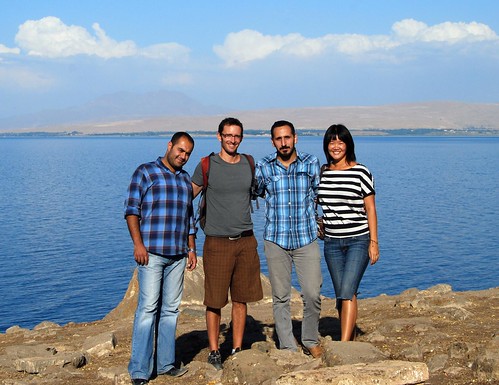
Four new buddies on Akdamar Island: Ozgur, Jeremy, Mustafa, and Hope.
When was the last time someone asked you for directions and you not only took them to their destination, but you spent your entire Sunday with them AND paid for their buses? And then you thanked THEM at the end of the day for “giving you something to do during Ramazan.” I’m guessing, oh, NEVER. We were astonished by the generosity that Mustafa and Ozgur showed us.
But wait, there’s more! The next day, we head to Van Castle at sunset, with its sweeping vistas over Lake Van and bird’s eye view of the old ruined city of Van.

Jeremy, exploring the ruins of Van Castle (with Van Lake in the background).
And this is where we met Nevaf, who gave us a ride back to town in the middle of a crazy dust storm, took us out to dinner at a restaurant that Mustafa recommended the day before, and then invited us to drink beers (unlike many Turks, he is Christian) on the shore of Lake Van as the dark fell on our final night in Turkey.
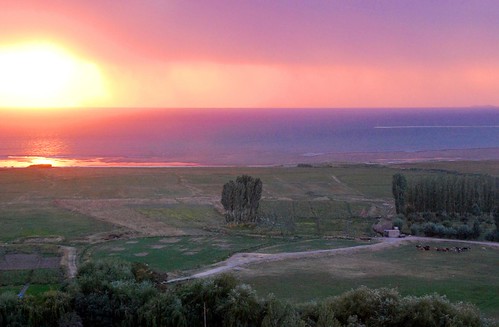
Incredible sunset over Lake Van.
So, wow…Van. Sure, the Church of the Holy Cross on Akdamar was very beautiful.
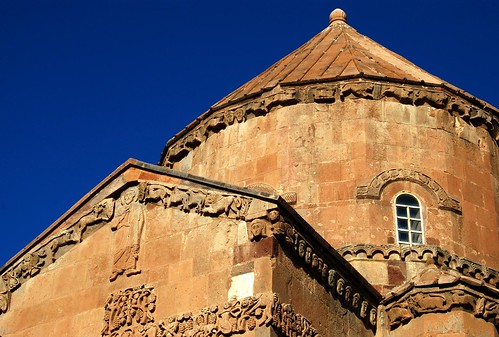
Detail of the Church of the Holy Cross on Akdamar Island. It is covered with gorgeous stone carvings on the outside and religious murals on the inside.
And we’ll never forget watching that sunset from the top of Van Castle.

Gorgeous sunset light framed by the ruins of Van Castle.
But we’ll always have a special little warm feeling in our hearts whenever we think of Van…and that is because of the generosity of both time and spirit shown to us by three Turkish friends. Thank you, Mustafa, Ozgur, and Nevaf, for showing us what true Turkish hospitality is all about.
Transportation from Kars to Van: Our bus ride from Kars to Van was so painless I can’t even remember it. Nice to have some of those every once in a while. 30 TL (US$20) per person.
Where we slept in Van: In a town with only a few budget options, Otel Bahar (right next to the big green mosque) delivers. Clean, spacious rooms, nice views of the mosque on the upper floors, central location, and free wi-fi. 50 TL (US$33) for a double room ensuite.




